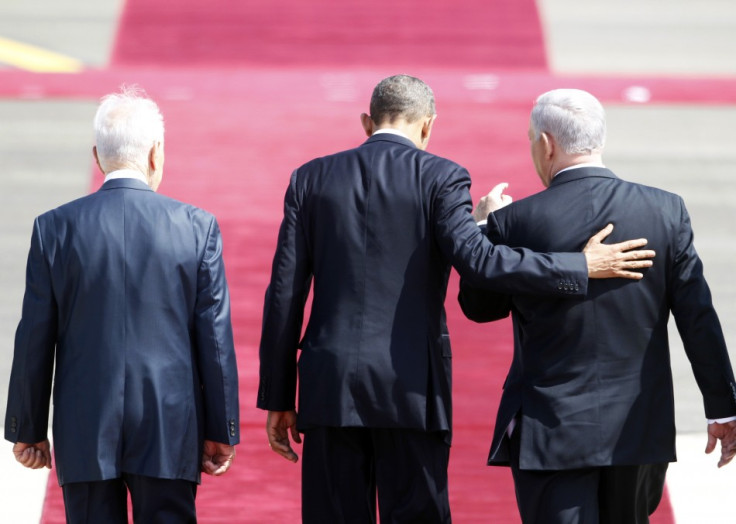Barack Obama Pledges Eternal US Support for Israel [VIDEO]

US President Barack Obama has pledged eternal support for Israel at the start of his highly symbolic two-day visit to the Jewish state, the first of his presidency.
Delivering the message from the Ben-Gurion International Airport in Tel Aviv, Obama said that "peace must come to the Holy Land" and reassured the Israeli public of the "unbreakable bond between our two nations".
He began with the simple greeting Shalom and said in Hebrew that "it's good to be back in the land of Israel".
"The United States is proud to stand with you as your strongest ally and your greatest friend," Obama said.
"Across this region the winds of change bring both promise and peril. [This visit provides] an opportunity to reaffirm the unbreakable bonds between our nations, to restate America's unwavering commitment to Israel's security, and to speak directly to the people of Israel and to your neighbours."
Invoking the Jewish people's thousands of years of history in the area, Obama continued: "We stand together because we share a common history.
"I know that in stepping foot on this land, I walk with you on the historic homeland of the Jewish people. More than 3,000 years ago, the Jewish people lived here, tended the land here, prayed to God here," Obama said, referring to the modern Israelis as the sons of Abraham and daughters of Sarah.
Israel and the Promised Land
Obama has denied that he will bring any proposals for a political solution to the Israeli-Palestinian conflict, and has said he plans to listen rather than lecture during his visit.
"From the tone set by his initial remarks, it's clear that Obama wants to communicate directly with the Israeli public and convey a message to them," said retired Brig. Gen. Michael Herzog, former head of the strategic planning division of the IDF and ex-special emissary for Israel's PM and minister of defence.
"He also wants to convey the message that he cares about Israeli security."
The visit is important on a symbolic and practical way, according to Herzog. "It's a rare occasion that an American president visits Israel and that happens just as both administrations are settling in," he said.
Obama's mention of Israel's millenary connection to the Promised Land is not casual, according to Herzog.
"In the 2009 speech in Cairo, Obama claimed that the state of Israel was a safe haven for those who escaped the Holocaust but forgot to mention the millenary connection of Jews to the Holy Land. This time he said that Jewish people lived here more than 3,000 years ago."
The bête noire: Iran
As many commentators pointed out, Iran will top the agenda at the meeting between Obama and Israeli Prime Minister Benjamin Netanyahu, who is expected to push for agreement on a "red line" for Iran.
The "red line" refers to the point in Iran's nuclear development at which joint military action would be taken, to prevent Tehran from getting the atomic bomb.
Israeli president Shimon Peres has described Iran as "the greatest threat to peace in the world".
"The most immediate issue is Iran," said David Makovsky, distinguished fellow and director of the Project on the Middle East Peace Process at The Washington Institute.
"It's a very central issue and there are important divisions on the strategy between the two. They might agree on the objectives - none of the two wants Iran to have nuclear weapons - but differ on strategies.
"Netanyahu will urge Obama 'Let's go big with this Mr President. Let's deal with Iran'. It's a very central issue."
A private channel for talks
Both experts agree that there will be a back channel for diplomatic talks that will not come out in the media and public appearances. Obama and Netanyahu, indeed, are expected to hold a four-hour talk session during which they will discuss Iran's nuclear program, the civil war in Syria and the moribund Israeli-Palestinian peace process.
The White House has strived to keep expectations for the visit extremely low, but substantial speeches will be heard in private, according to experts.
"The US will not launch any peace initiative now," says Herzog. "Obama's visit is rather to explore, test the water. The issue of the two-state solution is still on the agenda and will continue to do so."
"Obama does not want to be the president under which the two-state solution expres," agrees Makovsky. "The visit will be much more domestically focused but he expects [US secretary of state] John Kerry to tackle the issue in 2013".
The US president is also expected to stay silent on the issue of illegal settlements in the West Bank. The newly installed Netanyahu government is indeed one of the most pro-settler administrations in Israel's history.
"There are talks that Israel may freeze settlements behind the blocks, but it's hard to assess given the new government," confirms Herzog.
"Is it politically viable? It depends on the contest. We will see if right-wing elements such as Naftali Bennett [leader of far-right Jewish Home party] can swallow that."
© Copyright IBTimes 2025. All rights reserved.






















